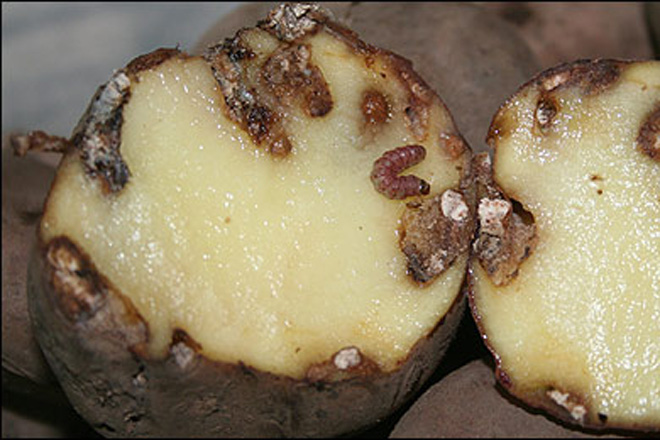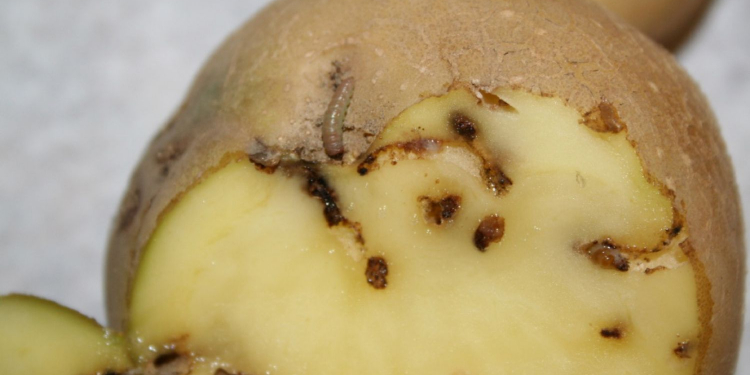On November 19, the Xunta announced the lifting of the ban on planting potatoes in nine other municipalities in the provinces of A Coruña and Lugo affected by the Guatemalan moth (Tecia solanivora povolny). Pending that the measure becomes effective once it is published in the DOG, from the consellería they advanced that
it could be cultivated again in Cariño, Ortigueira, Neda, Lourenzá, A Pastoriza, A Pontenova, Riotorto, Ribadeo and O Valadouro
because recorded no moth capture in the last two years. These councils are no longer infested areas and are now included as a buffer zone. Cultivation is allowed, but plantations will be closely monitored.

In addition, people who decide to plant have to notify the Ministry of Rural Affairs. They must cover a model declaration of plantation, which can be found in the different services of the Administration and send it to the department (in-person or online registration). They must state the area to be planted, where it is located and who is the person responsible for it. It will not be necessary to specify the kilos to be sown. Those interested should also know that to complete this procedure they have a maximum date until April 1. Farms where plantations are not reported will be considered illegal.
The declarations will allow the department to know exactly how many plantations there are . It is a relevant piece of information for the Administration, which will maintain the control and surveillance measures provided for in the legislation to control the spread of the moth.
Surveillance planting potatoes
From Medio Rural they remember that they will especially control the plantations included in the buffer zone. The surveillance and monitoring tasks will continue to be carried out by Tragsatec personnel, who usually carry out control tasks in the field, and the Xunta technicians will be in charge of taking the minutes in the event of non-compliance with the regulations. It is also not ruled out that over time a drone control will be activated to achieve a more exhaustive surveillance. In this sense, they
recall that the plant health law provides that 3,000 euros is the minimum amount for a fault classified as serious.
The Ministry also advances that, after reopening these nine councils to the potato plantation, if the case finally arises and the presence of the moth is detected in the coming months, areas by places or parishes would be closed for a period of two years.
«As cousas van mellor no control da prague. Foi moita xente who was involved and decided to planting potatoes »
Víctor Novo Vázquez, the head of the Vexetal Health and Production Service of the department, highlights that progress has been made in controlling the plague. He assures that of the 34 councils in which planting was initially prohibited to try to stop the advance of the moth, now there are only fifteen infested Galician municipalities in which this tuber cannot yet be cultivated.
“As cousas van mellor no control gives praga thanks to everything or effort that fixes and that is to make moita xente to abide by the guidelines, ” explained Victor Novo, who applauded the responsibility of those who are aware that with a bad individual action can harm an entire council and even large producing areas whose economies are based on potato cultivation: «Foi moita xente that was implied and deixou of planting. É unha praga moi specific: se non hai pataca, non hai praga. I think that we are polo or camiño thanks to the involvement of the people » . In addition to not cultivating, it was also effective to thoroughly clean and disinfect spaces where seeds or tubers accumulated.
Novo recalled that the monitoring commission appointed at the time holds at least two meetings a year (the next will be in April or May) in which the situation is analyzed and in which councils or territories the ban can be lifted or in which must go on. As a complement to surveillance, there are about 1,400 moth traps distributed in strategic locations throughout Galicia.
Does it depend on the variety?
With regard to the different varieties that are planting potatoes in Galician soil, the Ministry carried out a test in its day to find out if any of them were more resistant to this plague. The head of the service indicates that the study concluded that there is no greater resistance in one variety compared to others.








